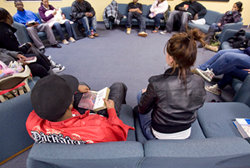Unions, Strikes ... and a Resurgence of the Social Gospel?
Body
“It might sound like hyperbole to say that this resurgent form of the Social Gospel is changing our politics. But its proponents have helped reshape many Americans’ perspectives.” - CNN
As iron sharpens iron,
one person sharpens another. (Proverbs 27:17)
“It might sound like hyperbole to say that this resurgent form of the Social Gospel is changing our politics. But its proponents have helped reshape many Americans’ perspectives.” - CNN
Another topic that received almost as much attention as the main theme at this year’s IFCA International Annual Convention, which was held in Lincoln, Neb., from June 28 to July 2, was social justice as well as the related subjects of critical race theory, intersectionality and wokeness.
“Sadly, I have come to the conclusion that my denomination is no longer evangelical, even in a broad sense. I am open to correction, but someone from the denomination will have to tell me how and where its partners in America and around the world are actively inviting people to accept Jesus Christ as Lord and Savior” - Roger Olson
 This essay’s first appearance at SharperIron was in January of 2009. Previous installments in the series: 1, 2, 3, and 4.
This essay’s first appearance at SharperIron was in January of 2009. Previous installments in the series: 1, 2, 3, and 4.
We have examined the vision of the gospel that is being propagated by Scot McKnight of North Park Seminary and by Timothy Gombis of Cedarville University. They are certainly not unique in the evangelical world. Indeed, their understanding of the gospel has become influential among an increasing number of evangelicals.
The theory, however, is not new. As an example, consider Walt. Like Scot and Tim, Walt did not wish to abandon the gospel of personal salvation. Also like Scot and Tim, he yearned for a gospel that could deal with problems that he deemed larger and more important. Here is what Walt said:
 Republished with permission from Baptist Bulletin May/June 2011. All rights reserved.
Republished with permission from Baptist Bulletin May/June 2011. All rights reserved.
Can churches create compassionate social ministries in their communities without inadvertently becoming sidetracked from their essential gospel motivation?
The question is not new—a promising young German seminarian slipped down this path in the 1880s. “The idea came to me that I ought to be a preacher, and help to save souls. I wanted to go out as a foreign missionary—I wanted to do hard work for God,” Walter Rauschenbusch said in 1913. “Indeed, one of the great thoughts that came upon me was that I ought to follow Jesus Christ in my personal life, and die over again his death,…and it was that thought that gave my life its fundamental direction in the doing of Christian work” (Rauschenbusch, “The Kingdom of God” in The Social Gospel in America, 1870–1920).
Rauschenbusch, who began his ministry with an orthodox view of salvation, would later become known as “the father of the social gospel.” Regrettably, once he became pastor in the Hell’s Kitchen district of New York City, he preached a different gospel, altering his Biblical message to address social ills such as poverty, unemployment, and malnutrition. In the process, Rauschenbusch lost his emphasis on Christ’s atoning sacrifice for the sinner.
Even today Christians tamper with the gospel message, as Rauschenbusch did, applying his ideas to our modern problems.
 Should Christians work to relieve the suffering of poverty? Near the end of the 19th century, proponents of the social gospel proposed a new answer to that question.1 Part of their answer wasn’t new at all—the idea that Christians should help the poor and bring the gospel to them. But the social gospel effectively claimed that relieving suffering in the world is the gospel.
Should Christians work to relieve the suffering of poverty? Near the end of the 19th century, proponents of the social gospel proposed a new answer to that question.1 Part of their answer wasn’t new at all—the idea that Christians should help the poor and bring the gospel to them. But the social gospel effectively claimed that relieving suffering in the world is the gospel.
Naturally, Christians who understood their Bibles ran in the opposite direction, aiming to bring the true gospel into sharp contrast with this new distortion. But in the process, many eventually embraced an attitude of total indifference to the poor and, worse, became habitually hostile toward any organized Christian effort to fight poverty.
In recent years things have gotten messier yet. In their haste to reject unbiblical reactions to the social gospel, many evangelicals (and some fundamentalists) seem to be over-correcting (“anti-anti-social-gospelism”?). They are rejecting the central error of the social gospel while accepting other components of the social liberalism that bred it.2
This series aims to help readers recognize and properly reject not only the social gospel but also other errors that have become ubiquitous assumptions of our times.
So far, we’ve briefly considered three questions:
Discussion